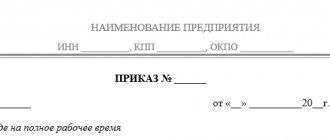The amount of wages depends on how many days an employee works in a month. If the month is worked in full, then the employee is entitled to a salary in the amount of the established salary. And if he did not work in full for a month, then his wages will need to be calculated. In addition, the salary will also depend on whether the employee worked on weekends or not. In this article we will look in detail at how the company calculates salaries for less than a full month.
When an employee has worked for a full month, he is entitled to a salary, and it does not matter how many working days there were in the month - 17, 18 or even 23. When an employee did not get a job at the organization from the beginning of the month or was on vacation, he does not work for a full month and his salary will depend on how much time the employee worked.
Payroll calculation if an employee just got a job
When hiring an employee not from the first day of the month, for example, in the middle or at the end, salary calculations are carried out in the same way as when calculating for an incomplete month.
Let's take a closer look at the example
Ivanov I.I. I got a job at Continent LLC not from the beginning of the month, but from August 4, 2021. Ivanov’s salary is set at 50,000 rubles. From August 4 to August 31 there are 20 working days. Let’s calculate Ivanov’s salary for the first working month:
50,000 / 23 x 20 = 43,478.26 rubles.
We take 23 to be the number of working days in August according to the production calendar.
Important! An employee's salary is one of the main conditions for cooperation between the employee and the employer. It must be specified in the employment contract with the employee.
General provisions
The relationship between a hired worker and an employer is regulated by the Labor Code ( No. 197-FZ dated December 30, 2001, current edition dated July 3, 2016, with amendments and additions coming into force from January 1, 2017).
According to Art. 2 of the Labor Code, the state guarantees the labor rights and freedoms of citizens and their protection. In accordance with the Labor Code of the Russian Federation:
- payroll payments to employees must be made within the established time frame;
- It is mandatory to timely and correctly calculate the employee’s salary while taking into account various deductions and deductions;
- it is obligatory to make deductions in the established amount to extra-budgetary funds;
- correct statistical and tax reporting is necessary.
Thus, the Labor Code of the Russian Federation ensures the right of every working citizen to full and timely receipt of a salary not lower than the minimum wage, which would ensure a decent life for him and his family.
In addition, when calculating wages, the following regulations are taken into account:
- Decree of the Government of the Russian Federation No. 922 of December 24, 2007 (as amended on December 10, 2016) “On the specifics of the procedure for calculating average wages”;
- Federal Law of November 7, 2011 No. 306-FZ (as amended on July 3, 2016, as amended on December 19, 2016) “On monetary allowances for military personnel and the provision of individual payments to them”;
- Resolution of the State Statistics Committee of the Russian Federation dated January 5, 2004 No. 1 “On approval of unified forms of primary accounting documentation for recording labor and its payment”;
- Federal Law dated October 2, 2007 No. 229-FZ “On Enforcement Proceedings” as amended on December 28, 2016 (Article 12);
- Tax Code of the Russian Federation dated July 31, 1998 No. 146-FZ (part 1) and dated August 5, 2000 No. 117-FZ (part 2) as amended on December 28, 2016;
- Federal Law No. 402-FZ dated December 6, 2011 (as amended on May 23, 2016) “On Accounting.”
If there are holidays at the beginning of the month
There are often situations when an employee gets a job on a day other than the first day of the month, but only because the first days were holidays.
For example, an employee gets a job immediately after the New Year or after the May holidays. He, like other employees, will work the same number of days this month; accordingly, he will receive his salary in full, despite the fact that he did not get a job from the beginning of the month.
Let's take a closer look at an example: (click to expand)
Kolosova N.P. are hired at the beginning of the new year. His first working day is January 9, 2021, since 1 to 8 are public holidays. Kolosov’s salary was assigned 35,000 rubles. Kolosov is entitled to his full salary for January. Despite the fact that he was registered at work only on the 9th, he worked all working days of the month, since the 1st to the 8th were weekends.
However, if a situation arises when an employee writes an application for leave of his own free will from January 9, 2021, the calculation will be different. In this case, the employee is not entitled to a salary, since he has not worked a single day. From January 1 to January 8 there were holidays, and from the 9th to the end of the month he was on vacation.
When is a working month considered not fully worked?
As stated in the Labor Code of the Russian Federation, the generally accepted working hours cannot be more than 40 hours per week. Thus, the norm is a 40 hour week.
If an employee is employed on special grounds specified in the contract, the norm for him changes by agreement of the parties.
According to the above information, it can be considered that any reduction in working hours established in accordance with the legislative framework can be considered part-time work.
Also, a month may not be fully worked for the following reasons:
- the employee was not employed on the 1st day of the current month;
- the employee quit before the end of the pay period;
- there was a vacation, business trip or sick leave in the billing period;
- there were absenteeism and absenteeism for various reasons.
To calculate wages as accurately as possible when working less than a full month, you need to take into account each factor individually, the applied wage system and the regional coefficient.
Formulas for calculating wages
Calculating wages for an incomplete month is a proportional calculation of the number of days worked.
In case of incomplete working of a month, the following formula must be used to calculate salary:
Formula:
Salary = Employee salary / Number of working days in a month * Number of days worked in a month
Note! The employee retains the right to agree with the employer on a reduction in working days per week or reduce the length of the working day.
But, even with mutual consent of the two parties, such a decision must be confirmed by an addition to the employment contract.
How to calculate salary for the month in which there was a vacation or business trip.
Salary examples
To calculate an employee’s salary for an incomplete month worked, you need to know all the necessary data. To do this, consider an organization with a five-day week and an employee I.S. Ivanov, whose salary is 30 thousand rubles.
Method No. 1
Ivanov I.S. went on vacation from January 9 to January 26 of this year. In January, including holidays from January 1 to January 8, there are 17 working days.
From January 27 to January 31 inclusive, Ivanov has 5 working days according to his schedule.
So, in addition to vacation pay, I.S. Ivanov should receive:
30000/17*5=8823.53 rub.
Method No. 2
Ivanov I.S. was on vacation from January 9 to January 31 of the current year inclusive. Thus, for January the employee will receive only vacation pay, and the first eight days of January will not be paid (holiday weekends).
For February, Ivanov will receive his full salary - 30 thousand rubles, provided that he works for a full month.
If wage calculations are carried out for an incomplete month, the employer is not obliged to pay the work of its employees less than the minimum wage (minimum wage) established by law.
Therefore, payment for a month not fully worked may be less than the minimum wage, because its amount is taken into account only when calculating payments for a full month worked.
Upon dismissal
Since the employment and dismissal of employees, as well as the calculation of their wages, are regulated by the employment contract, unless otherwise provided, the employer is obliged to pay the dismissed person:
- salary on the day of dismissal;
- compensation for unused vacation (if any);
- severance pay if justified.
At the time of dismissal of an employee, his salary is calculated for the time actually worked.
As established in Article 140 of the Labor Code, final wage payments to an employee upon dismissal must be made no later than the employee’s last day of work (dismissal day).
But, every rule has its exceptions, for example:
- actual absence from work (according to the legislative framework, he retains his position);
- when the employee did not work on the day of dismissal (in this case, payment is made no later than the day following the day the employee submits a request for payment).
Of course, there are situations when the employer and the resigning employee cannot agree on the amount of severance payments.
In such cases, the quitter has every right to file a complaint with the labor inspectorate and file a lawsuit against the employer in court.
Read more about calculating wages upon dismissal.
Example
In the event that an employee decides to quit without working a full month, wages are calculated according to the remuneration system used at the enterprise.
It is also worth taking into account compensation for unused vacation if the employee worked more than 15 days.
Initial data:
As an example, consider employee D.A. Petrov, who quits on April 15th. At the same time, Petrov’s salary is 20 thousand rubles.
Calculation:
If we assume that there are 22 working days in April, then the salary of D.A. Petrov is for less than a month in which the dismissal occurs will be:
20000/22*15=13636.36 rub.
If the employee worked on weekends
Even if an employee did not work fully for the whole month, for example, due to illness, he can work on weekends or holidays. But this does not mean that some days can be replaced by others, that is, if an employee was sick for 3 days and worked on weekends for 3 days in the same month, this will not mean that he worked the entire month. That is, it is impossible to simply pay him the required salary; it is necessary to make a calculation.
Let's take a closer look at an example: (click to expand)
Employee Turkina M.A. in October 2021, I took vacation at my own expense on the 4th, 5th and 6th. At the same time, in October she worked 3 days off – October 14, 21 and 28.
She worked 22 days in October, that is, as much as indicated in the production calendar, but she simply cannot pay the salary. Let’s calculate Turkina’s salary based on the fact that her salary is 30,000 rubles.
Work on weekends in the organization is paid at double the rate.
30,000 / 22 x 19 + 30,000 / 22 x 3 x 2 = 25,909.09 + 8,181.82 = 34,090.91 rubles.
What is taken into account when calculating?
To correctly calculate the amount of wages, the following circumstances should be taken into account :
- The amount of personal income tax is taken from the employee’s salary, and deductions for insurance purposes are made at the expense of the employer.
- The employee may receive advance payments.
- An employee may have obligations to pay alimony or other payments through enforcement proceedings.
- An employee can also receive various allowances, coefficients and bonuses.
Due to these circumstances, the amount of remuneration of the employee is reduced or increased.
If a person gets sick
Illness, like maternity leave, is not a reason for dismissal or deprivation of a subordinate’s salary. The legislator obliges the employer to preserve for the sick person the place and average earnings for the period during which, according to the certificate of temporary incapacity for work, the citizen was ill.
Sick leave benefits are paid from the following funds:
- enterprises – first 3 days:
- the remaining days of deductions are made by the Social Insurance Fund.
First, the employer makes payments from his budget, and then the Social Insurance Fund returns this amount to him.
When paying sick leave, different indicators are taken into account than for other reasons for absence from work. What matters here is:
- average salary for the last two years;
- total experience - with 5 years of experience, 60% of the minimum wage is given, with 6 - 8 years - 80%, from 8 years - 100%;
- availability of official employment.
If a citizen is employed unofficially, the employer does not contribute funds to the Fund, which means that the citizen is not entitled to a payment from it. Of course, you will also need a sick leave certificate issued by your attending physician.
Calculation with northern and regional surcharges
Northern and regional allowances are awarded to those citizens who work on shift or remotely.
These allowances apply to salary, hazard pay, length of service, class rank, academic degree, bonuses, and salary.
Read all about the 13th salary in our article.
They do not apply to business trips, vacation pay, sick leave, financial aid, and one-time payments.
Example.
Ilyin L.L. works in Vorkuta. He is 34 years old. His salary is 30,000 rubles. Additionally, he received a bonus of 10,000 rubles and financial assistance on the occasion of the birth of his daughter of 5,000 rubles.
For Vorkuta, the regional coefficient is 1.6, the maximum northern coefficient is 80%.
Regional coefficient: (30000+10000)*60% = 24000 rubles
Northern coefficient: (30000+10000)*30%=12000 rubles (since the northern bonus for Vorkuta is accrued at 10% after 6 months and every subsequent six months of work until the level of 60%, then 10% per year until 80% is reached ).
Total Ilyin L.L. will receive: 30000+10000+24000+12000+5000=81000 rubles.
Payroll calculation using a piecework payment system
The piecework payment system involves receiving remuneration only for the result of work, and is used where the results are expressed in material equivalent. As a rule, if such a system is used in production, then a daily production rate is established for each employee, for which he receives remuneration.
Salary calculation in this case does not differ for a full and partial month; it takes into account only the quantitative result of work and is made according to the formula:
Monthly salary = Quantity of products produced*unit cost of production
Piecework wages (calculation examples):
A factory worker works on a 5/2 schedule, producing 10 products per day. In September, he missed 5 working days, taking leave without pay, and actually worked 17 days out of 22. For one product, a worker receives 200 rubles. the salary for September will be:
17*10*200 = 34,000 rub.
In what cases is it necessary to calculate wages for an incomplete month?
The formation of wages is mainly carried out for the full pay period, i.e. for a fully worked calendar month. However, there are often cases when a person actually worked for less than a month, for a variety of reasons.
Here are the main ones:
- employee leave;
- being on sick leave;
- a person got a job in the middle or at the end of the billing period.
In addition, there may be preliminary agreements between the employee and the employer that he will work below the allotted time.
For example, an employee will carry out his activities for 3 days a week, and not 5 (if the company has a 5-day working week). Naturally, this agreement must be officially documented, with the signatures of both parties.









